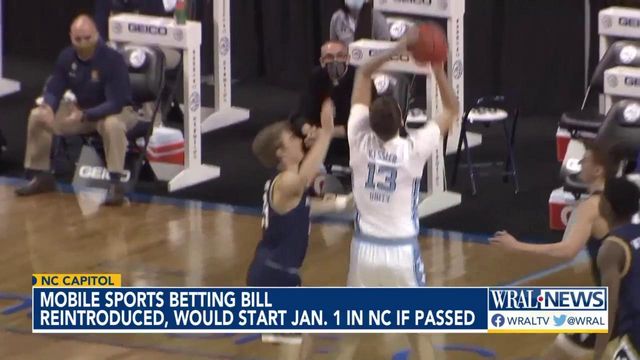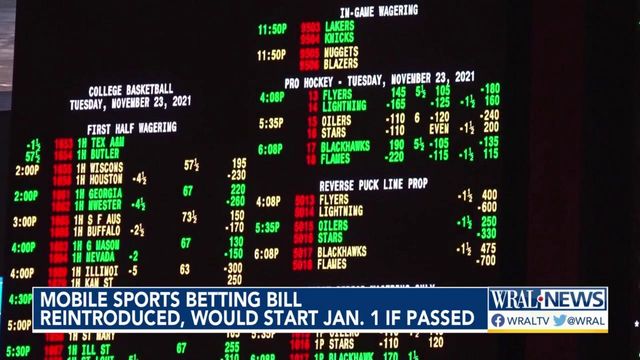Mobile sports betting in NC would begin Jan. 1 if new bill passes
A bill was filed Monday morning to legalize mobile sports gambling in the North Carolina. A similar bill failed by a single vote last year.
Posted — Updated“This bill is a bipartisan bill and we’ve learned a good bit from both sides about some of the tweaks that needed to happen,” said Jason Saine, a Lincoln County Republican and sponsor of the legislation. “We’ve worked to accommodate those concerns, and we believe we have a bill that can do better than pass. It can get broad support from both caucuses.”
The legislation is similar to the final House version of last year’s bill, which underwent drastic revisions after passing the Senate, including increases in fees and taxes for operators and changes to the revenue distribution.
A 2018 U.S. Supreme Court decision struck down a law that barred widespread sports gambling outside of a few states, most notably Nevada. More than 20 other states now allow mobile sports gambling, including Virginia and Tennessee. North Carolina allows sports gambling in person at three tribal casinos owned by the Eastern Band of Cherokee Indians and the Catawba Nation.
The North Carolina State Lottery Commission would be in charge of awarding licenses and regulating the industry.
More than $3.2 billion was wagered in Virginia in 2021 and more than $4.9 million was bet in 2022. Virginia doesn’t allow betting on its in-state college sports teams and the commonwealth, unlike North Carolina, does not have any major professional teams, though many in populous Northern Virginia follow Washington, D.C.’s teams.
Republican legislative leaders this week agreed to spend $29.7 billion in 2023-24's state budget.
The tax revenue generated from operators would be distributed to several entities around the state, including $2 million to the state Department of Health and Human Services for gambling addiction education and treatment programs. The current budget for the North Carolina Problem Gambling Program is $1 million and it has one full-time employee dedicated to the program. March is Problem Gambling Awareness Month.
The legislation includes $1 million for the state Division of Parks and Recreation to award $10,000 grants per county for youth sports equipment and facility improvements, as well as $1 million for the North Carolina Outdoor Heritage Advisory Council for grants to help teams travel for competitions and to attract sporting events and tournaments.
Low-funded athletic departments at seven state universities would each receive $300,000 annually. Elizabeth City State, Fayetteville State, North Carolina A&T, North Carolina Central, UNC-Asheville, UNC-Pembroke and Winston-Salem State are included in the bill, plus 10% of remaining revenue.
A new fund to attract major sporting events to the state would receive 30% of the remaining tax revenue, and 60% would go to the state’s general fund.
Some of the items that opponents of legalization argued against are in the bill. Opponents successfully stripped wagering on college sports last year on the House floor, but it is in the bill this year. So, too, is the ability of gamblers to fund their accounts by using a credit card, a sticking point for some critics.
Harrison, who led the opposition to the measure on the House floor last year, said she is not opposed to all sports betting. She said she could support a more modest expansion, such as allowing in-person wagering at certain venues across the state.
"It’s a predatory industry," Harrison said. "And it’s looking to raise money. It isn't looking to raise money for our state, it’s looking to raise money for the industry."
• Credits
Copyright 2024 by Capitol Broadcasting Company. All rights reserved. This material may not be published, broadcast, rewritten or redistributed.






